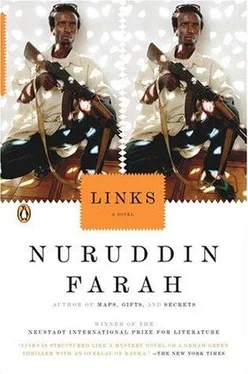The talk of robbery and plunder reminded Jeebleh of his passport and all the cash he was carrying. “Do you have a safe?” he asked.
“We do, somewhere here. Why?”
“I need to deposit my valuables.”
Bile pointed vaguely to a rug on the floor and explained that underneath was the safe — custom-built by Seamus of reinforced steel, with a digital lock.
Jeebleh brought out the wallet with the passport and money. Bile was immediately up on his feet, and the two of them shifted chairs, rolled up the rug, and lifted a section of the pine flooring. “Our Seamus at his most genial,” Jeebleh said excitedly.
When he had stored his things, he said, “Much of my life, when I look back at it, strikes me as a half-remembered dream. But I remember certain episodes with clarity. I remember our mothers, Caloosha and what he did to us, and of course I remember Seamus and the three of us in Italy.” Jeebleh’s grin was as gentle as the water’s surface in the wake of a duckling. “How much of your Plotinus do you still remember?” He recited quietly: “Never did eye see the sun unless it had first become sunlike.”
“In other words,” Bile interpreted the philsopher’s wisdom aloud, as though for his own edification, “an artist representing an image cannot presume to be an artist unless he is able to be the very figure being represented. Likewise, a man with a radical image who’s spent years in detention for political reasons must act forthrightly and without fear of the consequences.”
Jeebleh’s gaze launched itself into the shadowed darkness of an owl, bearing in its hoot a message of doom. Was it because Bile had quietly spun Jeebleh’s Italian nostalgia back to Mogadiscio? “What’s the latest about Raasta?” he asked.
Bile sat up so fast that he knocked his cup over, spilling some of the coffee sediments. Now both were on their feet, clumsily cleaning, Jeebleh dabbing at the low table and then the floor with a cloth.
“Not much more than what’s been in the papers,” Bile said, and paused judiciously. “We’re following a few leads.”
“So far no harm has been done to either girl?”
“We have no way of knowing.”
“How’s Shanta taking it?”
“It’s always hardest on a mother,” Bile said. “Shanta is in the habit of going off on excursions into the land of the insane.” He paused again. “It’s been very hard on her.”
“No word about Faahiye’s whereabouts?”
“I hear he’s left for Mombasa.”
“I’d like to see Shanta.”
His voice very faint, Bile said, “You will.”
It was as though a healing heart had been broken open. Lips closed, Bile ceased his breathing as he smothered his tearful emotions.
A phone rang, and he went to answer it in the study.
WAITING IN THE APARTMENT FOR BILE TO RETURN, JEEBLEH ENTERTAINED himself with memories dating back to before he and his friend were separated. Bile in those days had thought of himself as a kindred spirit of Plotinus, the ancient philosopher, born in today’s Asyut around A.D. 205. A hardworking, principled man, austere in his style of living and in the way he ran his personal affairs. He was said to be always in touch with both his spirituality and the material side of life. A man of peace, he arbitrated in the disputes of communities at war and managed to bring them closer without alienating either side. He also ran a charitable house, one section of it alive with the noise of young orphans, another part filled with destitute widows. Jeebleh recalled that after a book, The Life of Plotinus , had been smuggled into Bile’s prison cell and he had been caught reading it, he was severely punished. Bile returned from the study. He looked fine after the phone call, but Jeebleh sensed that the world in which they found themselves was ailing.
“How well do you know Af-Laawe?” Jeebleh asked.
“What can I say?”
“What’s his story?”
“You know the proverb—‘Tell me the names of your friends, and I’ll tell you who you are.’ Caloosha is his closest associate.” Bile clenched his hand tensely in a fist, his thumb inserted between forefinger and middle finger, in the vulgar Italian gesture of a fig.
“Is he a fraud?” Jeebleh asked.
“People speak of money missing from the UN coffers.”
“And why his nickname, ‘Marabou’? Just because of his funeral business?”
“You wouldn’t think you arrived only yesterday.” Bile smiled like a man who knew no sadness. After a pause, he went on: “He’s described by many as a cool customer and a con artist. So watch out, my friend!”
“Any idea what’s become of the stolen money?”
“I wouldn’t know.”
“And his NGO Funerals with a Difference?”
“He claims to bury the unclaimed corpses gratis, with free prayers for the soul of the dead thrown in for good measure,” Bile said. “But there’s a much darker side to his dealings. Shanta can tell you more than I.”
Again the phone rang, but this time Bile chose not to answer it.
STILL IGNORING THE PHONE — THE PERSON CALLING HADN’T USED THE CODE — Bile poured more coffee. The memory of sorrow flooded his vocal cords as he spoke. “Please accept my belated condolence over your mother’s death. She was like a mother to me too, and I miss her!”
“Maybe death was kind to her, coming when it did.”
“Unfortunately she depended entirely on Caloosha and her housekeeper,” Bile said, “and they were awful to her, I’ve heard. Caloosha had misled her, making her believe his version of events.”
“My letters to her were returned unopened.”
“I wouldn’t put anything past Caloosha.”
“Would you know how to reach my mother’s housekeeper?”
“We’ll ask around,” Bile said. “Shanta might.”
“And might she know where her grave is?”
“I doubt it, but we’ll ask,” Bile said. “Shanta has been in no state to think about anyone or anything else since Raasta’s disappearance. But I’m sure that with her help and Dajaal’s, we can locate your mother’s housekeeper, and then her grave.”
“I would appreciate it.”
Jeebleh noticed some potted plants, where a mantis, comfortable in its camouflage, was preparing to ambush another insect — swaying back and forth, head raised, fragile-looking forelegs extended, delicate body elegantly poised. Despite its devout posturing, the mantis was a predator, always on the attack. Jeebleh watched it in silent fascination, remembering the chameleon’s visit to his hotel room. The mantis bided its preying time, as slow as a sadist in its intention to torment its victim. Jeebleh couldn’t help comparing the antics of a mantis lying in wait, readying itself to pounce, to the modus operandi of a man who was a foe in the likeness of a concerned friend. He would act like the mantis and wait, lying low, until he was able to rid this society of vermin like Caloosha, a canker in the soul of his years of imprisonment and exile.
A housefly landed on Bile’s forehead: when chased away, it moved to Jeebleh, hesitating above his eyes and nose for a few seconds before finally and decisively alighting on his cheek. Not liking the housefly’s noise, the mantis slunk away quietly into hiding.
Now three phones rang all at once, and kept ringing. But Bile wasn’t prepared to answer them, not immediately. “I’d like you to move in with us,” he said. “There’s room for you. I’ve already prepared it, Raasta’s room.”
“Raasta’s?”
Bile looked so pale you would think he was hearing heavy treads on his own tomb. His sad expression caught the sun in its sweep, and Jeebleh stared at the specks of dust, recently stirred up by the restless housefly.
Bile went to answer the one phone that had not stopped ringing, and when he returned, he was in some distress. He spoke to Dajaal on his mobile, suggesting that he come to take Jeebleh back to the hotel.
Читать дальше












